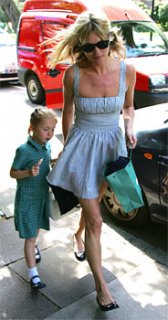excerpt from a guardian story about the style of moss...
How Kate reinvented the frock
....While we can't tell you when, precisely, the dress gained currency - we can tell you why. Two words: Kate Moss. Moss is, as you'll know by now, a fashion icon, the progenitor of all the great sartorial statements of the moment. (Not that she'll entirely accept that. When we ask her if she was born cool, Kate Moss just laughs at us.)
Now she has reinvented the frock. She's made it make sense to us, the shopping hordes, all over again. Moss has taken cocktail dresses and skanked them up for daytime by combining them with battered, flat, vintage Westwood pirate boots and biker jackets. She has taken simple, unstructured jersey dresses and glammed them up with fiercely tailored oversized tuxes. She has taken full-length vintage couture and given it edge; on one occasion, by customising it on the hoof, tearing off the lower portion of a cream Dior number when it ripped during a party for a Dior retrospective at the Victoria and Albert Museum. She has taken the skin-tight mini-dress and made it razor sharp, where once it was just slaggy.
Which perhaps explains why dresses account for so much of her incoming Topshop range. The stars of the high summer collection, which hits stores this week, are the frocks: the pansy-print ruffle-front wrap dress (£60); the bright-red butterfly-sleeve mini-dress (£150); the blue-sequinned sleeveless dress (£150).
Playing with the dress concept is a recurring preoccupation, Moss says. Now 34, she's been at it for some time. 'I remember dressing as a punk aged 10,' she says. 'Green lipstick, backcombed hair, Mum's T-shirt as a dress...'
Generally, Moss: 'didn't really aspire to look like anyone else [when I was younger]. I shopped for myself, mostly at jumble sales and Oxfam.' When Storm model agency boss Sarah Doukas spotted her at JFK airport, and signed her up, Moss was wearing 'a white shirt and jeans, and I felt very cool'. She quickly adopted the standard 'model uniform', of the mid-Nineties, when her career began. 'Everyone wore jeans and a boot,' she says (note standard practice industry use of the singular on 'boot').
As she reached superstar status, Kate Moss ditched the industry uniform in favour of her own inventions - outfits which her increasingly adoring public began to copy. Yet there was not, Moss says, a moment when she realised women wanted to dress like her. 'Not really,' she says, after a long pause.
Is it annoying, or flattering?
'Ha! It's flattering!'
Why does she think it happens? What is it about her that exerts power over women? 'I think it's because I don't follow a trend. I just have a thrown-together look.'






 Kate looks amazing in the ad pics.
Kate looks amazing in the ad pics.

